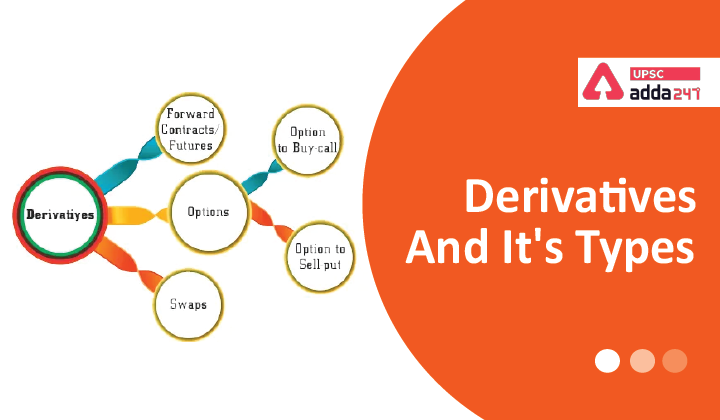Table of Contents
What are derivatives?
- A derivative is a contract between two parties, where the contract derives its value/price from an underlying asset.
- The most common types of derivatives are forwards, futures, options, and swaps.
- Underlying assets could include commodities, stocks, bonds, interest rates, and currencies.
- People enter into derivative contracts to earn a huge amount of profits by contemplating the underlying asset’s value in the future.
Types of derivatives
Forward
- A forward contract is a customized contract between two parties, where settlement takes place on a specific date in future at a price agreed today. The main features of forward contracts are
- They are bilateral contracts and hence exposed to counter-party risk.
- Each contract is custom designed, and hence is unique in terms of contract size, expiration date and the asset type and quality.
- The contract price is generally not available in public domain.
- The contract has to be settled by delivery of the asset on expiration date.
- In case the party wishes to reverse the contract, it has to compulsorily go to the same counter party, which being in a monopoly situation can command the price it wants.
Futures
- Futures are exchange-traded contracts to sell or buy financial instruments or physical commodities for a future delivery at an agreed price.
- There is an agreement to buy or sell a specified quantity of financial instrument commodity in a designated future month at a price agreed upon by the buyer and seller.
- To make trading possible, BSE specifies certain standardized features of the contract.
Difference between forwards and futures
| Sr.No | Basis | Futures | Forwards |
| 1 | Nature | Traded on organized exchange | Over the Counter |
| 2 | Contract Terms | Standardized | Customised |
| 3 | Liquidity | More liquid | Less liquid |
| 4 | Margin Payments | Requires margin payments | Not required |
| 5 | Settlement | Follows daily settlement | At the end of the period. |
| 6 | Squaring off | Can be reversed with any member of the Exchange. | Contract can be reversed only with the same counter-party with whom it was entered into. |
Options
- Options are derivative contracts that give the buyer a right to buy/sell the underlying asset at the specified price during a certain period of time.
- This contract does not require any compulsion to discharge the contract on a specific date, which means the buyer is not under any obligation to exercise the option.
- Options contracts provide the right but not the commitment to buy or sell an underlying instrument.
Swap
- Swap contracts are the most complex contracts, among the four derivatives.
- Swap contracts mean the agreement is done privately between both parties. The parties who of the swap contracts agree to exchange their cash flow in the future as per a pre-determined formula.
- Under these types of contracts, the underlying security is the interest rate or currency, as these contracts protect both parties from several major risks.
- These contracts are not traded to the Stock Exchange as investment banker plays the role of a middleman between these contracts.
Also Read:





 TSPSC Group 1 Question Paper 2024, Downl...
TSPSC Group 1 Question Paper 2024, Downl...
 TSPSC Group 1 Answer key 2024 Out, Downl...
TSPSC Group 1 Answer key 2024 Out, Downl...
 UPSC Prelims 2024 Question Paper, Downlo...
UPSC Prelims 2024 Question Paper, Downlo...





